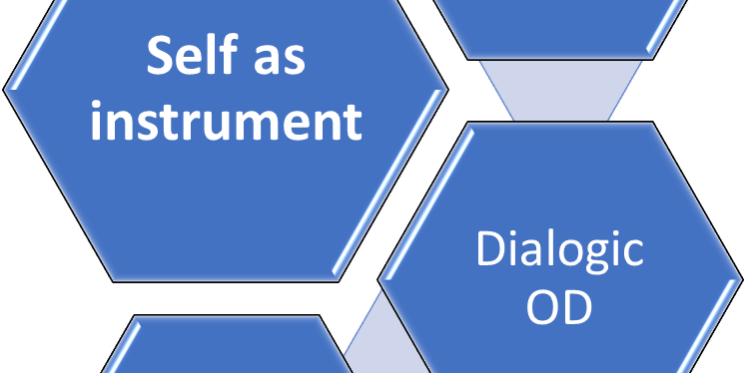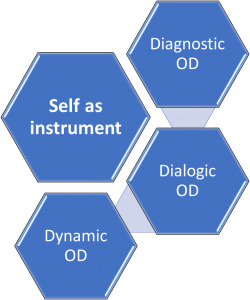Part 3: Self as Instrument for OD
Guest blog from: John Hovell PMP, CKM, ODCP
You are the primary “instrument” in OD!
Organisational Development is a wide and varied field, but let’s not overwhelm ourselves, it simply starts with you.
You are the primary instrument for OD work. We call this “use of self” or “self as instrument”. Many practitioners have written about this concept, especially Dr Mee-Yan Cheung-Judge. According to her, Use of Self basically means that we “dedicate time to the on-going maintenance of both self-knowledge and technical expertise.”[1]
We continually develop ourselves to hone our practice and extend our OD range. There are many mindsets, skillsets and toolsets that we bring into OD, and yet they all rely on our ability to continually develop our primary instrument, which is our self. The concept of Use of Self is nearly as broad as the field of OD!
Self as Instrument Overview
Let’s continue to describe the concept of “use of self”. There are dozens of broad definitions for Use of Self, we will offer a few here. For a more detailed description of Use of Self, we have Mee-Yan’s permission to share her latest research with Professor David W. Jamieson. In that research, they use nine (9) “clusters” to help describe the different areas of Use of Self. For even more detail on these clusters, as well as a self-assessment, please visit their website.
Definitions and Dimensions of Use of Self
Use of Self is a broad and ambiguous concept. The definitions below come from known experts to help frame the general territory.
- Dr Mee-Yan Cheung-Judge
- “Whenever we are in flow with our external observation and awareness, our internal awareness of the “here and now”, and using resources we have (e.g. intellect, cognitive ability, perceptual insights, emotional texture, personality, experience, values, character, skills, social sensitivity, etc.) based on our discerning judgement/intentional choice of decisions as to what right course of action we are willing to put ourselves on the line to execute the work in order to achieve the impact the situation requires”
- Mary Ann Rainey and Brenda B. Jones
- “Acting on feelings, observations and thoughts to advance the work of the client”
- Charlie Seashore
- “Consists of intentional, conscious and deliberate choices which result in action/behaviours taken to bring about change”.
More Detail Inside the 9 Clusters of Use of Self
Building upon those examples of broad definitions for Use of Self, there are 9 clusters that further describe the detail areas of Use of Self. They intend to help describe the key areas of Use of Self in more detail. Each cluster is described below.
Cognitive Cluster
The Cognitive Cluster refers to an individual’s ability to “see and think” through situations. For example, in the Cognitive Cluster we consider an individual’s cognitive ability to sift through data and make sense and meaning out of it. The more sense and meaning we can make out of all the data available to us, including un-documented or even invisible “felt” data, the potent our Use of Self can be. Further examples in this cluster include our cognitive ability to perceive and express strategic insights in seeing human systems. Seeing from a systems point of view and ability to tolerate ambiguity are also key aspects of the Cognitive Cluster.
Affiliative/Emotional Cluster
The Affiliative/Emotional Cluster includes an individual’s awareness and ability to express their own emotions, especially in relation to the emotions of other people. For example, an individual’s depth and range of empathy would be included in this cluster. Another example within this cluster would be showing grace for other people and their situations. Holding positive regard for other people, showing compassion, and being willing to extend oneself in service of others are all examples of Affiliative/Emotional Use of Self capabilities.
Courage Cluster
Some situations call for courage. Without courage to speak up or take action, it can be possible for unacceptable behaviours to continue. The Courage Cluster calls for individuals to dare to take evocative and provocative stances when necessary. Dare to differentiate and hold one’s own opinion. Present reality in a crisp and accessible manner. Have the courage to put your ‘self’ on the line is a critical component of the Courage Cluster.
Character Cluster
Character can be defined as “the mental and moral qualities distinctive to an individual.”[2] Given that definition, character is a critical portion of Use of Self because an individual without character is an individual without the mental and moral qualities to be positively distinctive. Examples within Character Cluster include depth and range of trustworthiness, ability to show humility, respectful to other people, grounded level of confidence, desire to serve other people, and many other examples.
Skills Cluster
There are many “skills” necessary within Use of Self. This particular cluster is a bit of a catch-all to remind us of the broad range of skills we need to fully engage our Use of Self. For example, this cluster includes “depth and range of listening skills”. It also includes an individual’s ability to leverage similarities and differences across people. A key skill within Use of Self is the ability to conduct “experiments” on the go, using inquiry to build relationships. This particular cluster is likely to grow and emerge as Use of Self research and practice continues.
Values Cluster
Values are core to OD work. It is critical to remain congruent with self as well as adhering to OD values. Examples of OD values include appreciation of diversity, commitment to equality and inclusion, commitment to democratic processes, and willingness to maintain a learning & development stance. Justice and fairness along with humanitarian values are also core OD values. Let’s not forget a commitment to scientific inquiry and research, balanced along with a client-centric focus as well. These are all core values that need to be practiced and demonstrated as part of Use of Self.
Self-Work Cluster
The Self-Work Cluster refers to an individual’s ability to work on themselves. For example, increase your sense of awareness of self and others. Maintain a sense of groundedness. Authenticity, being real and transparent are examples of Self-Work. Continually expanding your range of mindfulness and awareness especially by working on unresolved issues in your own life. Being willing to invest to do your own inner work, knowing how to stay choiceful and intentional with yourself. Overall, self-work is about believing that you help/heal/cure yourself first in order to serve others in their work.
Discipline (Self Management Cluster)
The Discipline and Self Management Cluster is mostly about focus. Continuing to seek feedback and learning opportunities is a key aspect of this cluster. Undertaking supervision and cultivating habits that increase your ability for generative thoughts and emotional renewal fit within this cluster. Practice relating to others and learning when to share, and when not to share can be examples of a disciplined Use of Self. In the Discipline Cluster, we especially practice our ability to stay non-reactive to challenging situations and people, separating our own needs from the needs of other people.
Continuous Self-Work and Growth Cluster
Self-Work is so important that we’ve added an additional “Continuous Self-Work and Growth” cluster. The previously mentioned Self-Work Cluster reminded us to do Self-Work at least once, whereas this cluster specifically calls for continual practice and growth of our self work. For example, staying curious about your evolving self and noticing your own behaviour/thought patterns. Intentionally and choicefully growing our range in skills and self-management. Being a reflective practitioner, noticing your own thoughts, words and actions, especially in a way to manage boundaries is a key portion of this cluster.
To close… for now
In this article, we have briefly looked at the concept of “Use of Self” and “Self as Instrument”. This is a core concept for OD practitioners to understand and continually practice. This concept also aligns with the 3 core areas of OD:
– Diagnostic OD
– Dialogic OD
– Dynamic OD
This overall framework underpins The Henley Forum’s Advancing your OD Practice programme that is offered at Henley Business School. Dr. Sharon Varney and I use this framework to help participants better understand what strengths they bring to this field, and to prompt them to take a step or two in advancing their OD Practice.
In our previous articles, Sharon and I offered you this framework in more detail:
– Part 1: A mindset, skillset and toolset for change
– Part 2: A framework for advancing your OD practice
– Part 3: Self as an instrument for OD
Stay in touch
If you’d like to discuss applying this within your organisation, please drop Sharon and John a line:
sharon.varney@spaceforlearning.com | +44 (0)7946 581875 | spaceforlearning.com
John.Hovell@STRATactical.com | +1 (703) 470-9040 | STRATactical.com
Dr Sharon Varney and John Hovell lead The Henley Forum’s Advancing your OD Practice programme at Henley Business School.
The programme is unique (we believe) in bringing together people from different fields. Some have considerable OD experience and are looking to extend their practice. Others bring valuable expertise and life experience from other domains, and are taking their first steps in the OD world. That diversity creates a rich learning experience.
The next programme takes place on 22-23 January 2019 at Henley Business School.
More information at: https://www.henley.ac.uk/events/advancing-your-od-practice
Reserve your place by emailing henleyforum@henley.ac.uk
[1] CHEUNG-JUDGE, M.-Y. 2012. The Self as an Instrument: A Cornerstone for the Future of OD. OD Practitioner, 44, 42-47.








